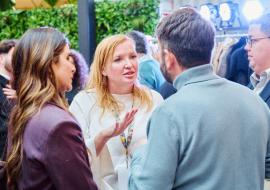Q & A with Vitan Ivanov, President of the Sofia Tourist Council in Bulgaria
A lawyer by trade, Mr. Ivanov has been involved in the travel sector since 1994 as chairman of a world-class tour operator -Protocol CD- and president of the Sofia Tourist Council
Q.- How do you assess the advance of Bulgaria’s travel industry over the past 15 years?
A.- Over the past 15 years Bulgaria has built many high-end hotels, especially along our side of the Black Sea, as well as many winter travel resorts. This led us to draw a line between summertime and wintertime tourism.
Right now, all of the country’s tour operators and tourist councils are working hard to get a one-and-only local travel product and underscore cultural tourism, wine travel, monasteries and all those tourist categories, let alone call for the development of multi-travel tourism.
Last year, tourism accounted for 14 percent of Bulgaria’s GDP, some €2.5 billion, and it keeps going stronger. We welcomed 5 million tourists last year and we hope to reel in some 6 million visitors in 2007. Of course, this is not too much for Bulgaria due to the many hotels that have been built along the shoreline and up in the mountains.
There are some 1,700 hotels in Bulgaria and it’s been just a year since we began building spa resorts. I must add that Bulgaria is one of the countries in the world with a large number of mineral water springs. For instance, there are 43 mineral water springs in Sofia that unfortunately are not operating for tourists. There’s just a spa hotel in Bankya, close to Sofia, yet we don’t have that kind of lodging in the nation’s capital.
Q.- What actions are you devising for the nation’s capital and the rest of the country to make tourism up to par with other travel destinations within the EU?
A.- The main issue here is the poor budget the state-run tourism agency banks on. Last year the agency counted on €3 million. However, an extra fund of €1.5 million was allotted to the agency by the end of the year. It’s impossible to make tourism advance in the country with this little money. Most of that money is earmarked to secure Bulgaria’s attendance to travel fairs and tradeshows worldwide, and to print out advertisement material for our presentations and booths in those events. Thus, most of the funds are funneled into the promotion of Bulgarian tourism in our strategic outbound markets.
Q.- What are Bulgaria’s top outbound markets?
A.- The UK, Germany, Russia –a fast-growing market- and Rumania. We have an increasing interest in the Chinese market.
Q.- What actually singles out Sofia from other capitals in the Balkans?
A.- If we look back into history, we’ll find out that all Thracian kings took part in the battle for Troy, and according to Homer’s Iliad, all of their riches and wealth belong to the Thracian kings. We must say there have been wrought-gold items in Bulgaria since the dawn of mankind, the oldest in the world, and I’m talking about the necropolis of Verna more than 1,000 years ago. There’s no gold in the world older than ours. That explains the existence of a very old civilization. Recent researches bear out all latest gold findings in the Thracian Valley, harking back to over 2,500 years ago. There’s a huge, an immense civilization here. Bearing in mind that Orpheus’s lands hold the world’s oldest mountains –the Rodopes- that an allure big enough to draw in tourists from Spain and other markets. We’re working on that kind of market and we’ve got something to vie with.
Q.- Do you see a future for the MICE segment in Sofia?
A.- Certainly there are great chances on the road ahead for the MICE segment in Sofia. Last year, the National Palace of Culture grabbed the European Award to the Best Congress Venue. Bearing in mind that an increasing number of airlines are flying to Sofia at very reasonable fares, chances are we are in a position to ratchet up the amount of events coming to the nation’s capital. There are hotels in the city run by world-class chains like Sheraton, Milton, Radisson, large enough to guarantee the advance of that tourist niche. This year, Sofia will join the Organization of European Tourist Cities and is currently a member of the Organization of European Congress Hosting Cities. This certainly takes Sofia up a peg in that field.
Q.- You said at the top of this interview that Spain is number 28 among Bulgaria’s outbound markets. How’s that possible?
A.- Spaniards don’t need beaches and they don’t need mountains either. They climb the Alps rather than coming over here. However, if we divide the number of tourists per season by the tourist categories, like skiing and beach, I think Spain will climb up to number seven or eight, especially in such fields as multi-travel trips, FAM trips, cultural tourism and sightseeing spots.














